The Baker Exegetical Commentary on the New Testament | BECNT (17 vols.)
Digital Logos Edition
This collection is no longer available and the Baker Exegetical Commentary on the New Testament series collection has been updated and is available for purchase.

Overview
The Baker Exegetical Commentary on the New Testament (BECNT), one of today’s most respected sources for New Testament exegetical studies, equips you to know the gospel better. Praised for its thoughtful scholarship for studying pastors and its readability for inquiring lay people, the BECNT is a standard exegetical commentary for any Bible-study library. Included in this set is David E. Garland’s 1 Corinthians, which was honored in 2004 with Christianity Today’s Award of Merit for Biblical Studies.
Along with its reputation as an approachable study for both pastors and lay people, the Baker Exegetical Commentary on the New Testament upholds a strong respect for biblical truth in its scholarly approach. The BECNT includes the work of a wide variety of scholars from differing theological persuasions, offering a diverse bank of scholarly knowledge, while maintaining its allegiance to biblical truth. By investigating a variety of viewpoints while maintaining a firm grasp on the truth, the BECNT gives you an authoritative view of each study passage.
One of the BECNT’s best features is that it allows you to study New Testament Greek texts. Each volume contains the original Greek words as well as, right after them, the corresponding transliterated and translated phrases, allowing you to understand pronunciation and definitions quickly without sacrificing readability, even if you have little or no Greek experience. The BECNT opens up the New Testament, allowing you to understand language and context and, therefore, develop a deeper, more accurate study routine. The Greek translations are the original work of each author.
- Blends academic sophistication, pastoral sensitivity, and accessibility
- Includes abbreviations and Hebrew and Greek transliteration
- Provides indexes of subjects, authors, Greek words, Scripture passages, and other ancient writings
In this age of unprecedented proliferation of biblical commentary series, it is an outstanding accomplishment for the Baker Exegetical series consistently to have produced what, with only rare exceptions, have become the best available commentaries on the Greek text of the New Testament book or books treated.
—Craig Blomberg, Denver Journal
This series has set a new standard in reader-friendliness with its attractive presentation that combines detailed exegetical comment on the Greek text with accessibility for those who have little or no knowledge of the original language of the New Testament.
—I. Howard Marshall, emeritus professor of New Testament exegesis, University of Aberdeen
- Title: Baker Exegetical Commentary on the New Testament (BECNT)
- Series: Baker Exegetical Commentary on the New Testament
- Publisher: Baker Academic
- Volumes: 17
- Pages: 11,974
- Resource Type: Commentaries
- Topic: New Testament
- Matthew by David L. Turner
- Mark by Robert H. Stein
- Luke 1:1–9:50 by Darrell L. Bock
- Luke 9:51–24:53 by Darrell L. Bock
- Acts by Darrell L. Bock
- Romans by Thomas R. Schreiner
- 1 Corinthians by David E. Garland
- 2 Corinthians by George H. Guthrie
- Galatians by Douglas J. Moo
- Ephesians by Frank Thielman
- Philippians by Moises Silva
- 1–2 Thessalonians by Jeffrey A.D. Weima
- James by Dan G. McCartney
- 1 Peter by Karen H. Jobes
- 1–3 John by Robert W. Yarbrough
- Jude and 2 Peter by Gene L. Green
- Revelation by Grant R. Osborne
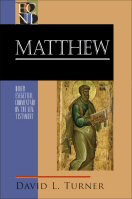
New Testament scholar David Turner offers a substantive yet highly accessible commentary on Matthew. With extensive research and thoughtful chapter-by-chapter exegesis, Turner leads readers through every aspect of the Gospel of Matthew—sociological, historical, and theological—to help them better understand and explain this key New Testament book.
As the first Gospel in the canon, Matthew has received a great deal of attention through the centuries from both scholars and preachers. Turner attempts to stand between the two groups and offer a commentary that is fresh, accessible, and insightful. He emphasizes Matthew as a literary work in its own right (rather than in relation to Mark and Luke) and includes important insights into the Jewish background of this Gospel, explaining Matthew in the context of Second Temple Judaism as a book for Christian Jews living among nonbelieving Jews.
A fine commentary that will be of significant value especially to pastors, teachers, and students as one of the first commentaries they reach for when they attempt to unpack this Gospel.
—Michael J. Wilkins, Journal of the Evangelical Theological Society
This is a solid, streamlined treatment of Matthew that gets to the heart of the key issues in each passage and avoids turning itself into a multivolume commentary, like so many recent offerings on the Greek text of one of the Gospels. . . . Turner, moreover, shows just how close a progressive dispensationalist can come to mainstream evangelical perspectives; only rarely will nondispensationalists find themselves disagreeing with him. Warmly recommended.
—Craig L. Blomberg, distinguished professor of New Testament, Denver Seminary
David L. Turner is a graduate of Cedarville University, Grace Theological Seminary, and Hebrew Union College-Jewish Institute of Religion, Cincinnati. He has been a professor of New Testament at Grand Rapids Theological Seminary since 1986 and has published several articles on the Gospel of Matthew.
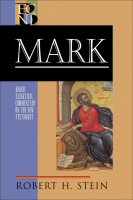
In this volume, respected New Testament scholar Robert Stein offers a substantive yet highly accessible commentary on the Gospel of Mark. The commentary focuses primarily on the Markan understanding of the Jesus traditions as reflected in this key New Testament book. The author analyzes each section in Mark to show how it fits the immediate and larger context of the Gospel. He offers verse-by-verse comments on the words, phrases, sentences, and themes found in the section, and he explores what Mark is seeking to teach.
Robert H. Stein has composed an excellent commentary on Mark 1:1–16:8. He explains well the purpose and structure of the Gospel, discusses in detail its problematic verses, judiciously selects views of other commentators, and explains why he thinks the Gospel ends at 16:8. Hence Stein’s commentary will be a precious vade mecum for pastors and preachers, students of the New Testament, and teachers in biblical studies.
—Joseph A. Fitzmyer, professor emeritus, biblical studies, Catholic University of America, Washington, DC
Bob Stein has written a great commentary on the Gospel of Mark. It is rich with interpretive insight, yet it is very reader friendly. Scholars, pastors, students, and lay readers will appreciate how Stein tackles difficult questions head-on and presents sensible solutions. Reading this commentary gives the reader a real sense of what the evangelist Mark was trying to say and how his original readers would have understood him. It makes an excellent contribution to the BECNT series.
—Craig A. Evans, Payzant Distinguished Professor of New Testament, Acadia Divinity College, Nova Scotia
Robert H. Stein (PhD, Princeton Theological Seminary) was most recently senior professor of New Testament interpretation at The Southern Baptist Theological Seminary in Louisville, Kentucky. He taught at Bethel Seminary. A world-renowned scholar of the Synoptic Gospels, Stein has published several books, including The New American Commentary: Luke, A Basic Guide to Interpreting the Bible, Studying the Synoptic Gospels, and Jesus the Messiah.
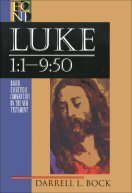
In the first of two volumes on the Gospel of Luke, Darrell L. Bock offers students of the New Testament a substantive yet highly accessible commentary. With extensive research and thoughtful chapter-by-chapter exegesis, Bock leads readers through all aspects of the third Gospel—sociological, historical, and theological. The result is a guide that clearly and meaningfully brings the first part of this important New Testament book to life for contemporary readers.
Bock’s two volumes on the Gospel of Luke are the inaugural volumes of the acclaimed BECNT series. As with all BECNT volumes, Luke 1:1–9:50 features the author’s own translation of the Greek text, detailed interaction with the original text, and a user-friendly design. This informative, balanced commentary also includes extensive introductory notes. It admirably achieves the dual aims of the series—academic sophistication with pastoral sensitivity and accessibility—making it a useful tool for students, professors, and pastors.
Each section of the text is addressed from a clearly organized series of perspectives. If there is such a thing as a user-friendly two-volume commentary on a single book, this is it!
—Craig L. Blomberg, distinguished professor of New Testament, Denver Seminary
This excellent commentary on the Lucan Gospel is massive, but well written, informative, and judicious. . . . It should be a boon for pastors, priests, seminarians, and all educated general readers interested in the interpretation of the Gospels. Bock has read widely, asks the right questions, and gives a balanced answer in his interpretation of this Gospel.
—Joseph A. Fitzmyer, professor emeritus, biblical studies, Catholic University of America, Washington, DC
Darrell L. Bock (PhD, University of Aberdeen) is a research professor of New Testament studies at Dallas Theological Seminary. He is the author or editor of many books, including Jesus according to Scripture and Studying the Historical Jesus.
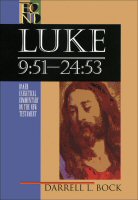
In the second of two volumes on the Gospel of Luke, Darrell L. Bock offers students of the New Testament a substantive yet highly accessible commentary. With extensive research and thoughtful chapter-by-chapter exegesis, Bock leads readers through all aspects of the third Gospel—sociological, historical, and theological. The result is a guide that clearly and meaningfully brings the second part of this important New Testament book to life for contemporary readers.
Bock’s two volumes on the Gospel of Luke are the inaugural volumes of the acclaimed BECNT series. As with all BECNT volumes, Luke 9:51–24:53 features the author’s own translation of the Greek text, detailed interaction with the original text, and a user-friendly design. This informative, balanced commentary also includes extensive introductory notes. It admirably achieves the dual aims of the series—academic sophistication with pastoral sensitivity and accessibility—making it a useful tool for students, professors, and pastors.
Each section of the text is addressed from a clearly organized series of perspectives. If there is such a thing as a user-friendly two-volume commentary on a single book, this is it!
—Craig L. Blomberg, distinguished professor of New Testament, Denver Seminary
This excellent commentary on the Lucan Gospel is massive, but well written, informative, and judicious. . . . It should be a boon for pastors, priests, seminarians, and all educated general readers interested in the interpretation of the Gospels. Bock has read widely, asks the right questions, and gives a balanced answer in his interpretation of this Gospel.
—Joseph A. Fitzmyer, professor emeritus, biblical studies, Catholic University of America, Washington, DC
Darrell L. Bock (PhD, University of Aberdeen) is a research professor of New Testament studies at Dallas Theological Seminary. He is the author or editor of many books, including Jesus according to Scripture and Studying the Historical Jesus.
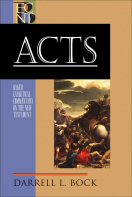
In this volume, Darrell Bock provides a thoroughly evangelical commentary on Acts. With extensive and current research from major works written in the last 15 years and thoughtful chapter-by-chapter exegesis, Bock covers all aspects of the book—sociological, historical, and theological—for a deeper understanding of Acts. He also seeks to make his commentary readable and concise for those that are not knowledgeable in Greek.
Darrell Bock’s long-anticipated sequel to his fine and detailed work on the Gospel of Luke is now available . . . Written in a clear and engaging manner that most anyone can grasp, yet without skimping on interaction with scholarly discussion, Bock manages to critically analyze the huge corpus of literature on Acts with grace and finesse and to make his own contributions along the way. This commentary will serve us well for many years to come.
—Ben Witherington III, professor of New Testament, Asbury Theological Seminary, doctoral faculty, St. Andrews University
While unfailingly traditional in its interests and scope, Bock remains in touch with today’s church by seeking to facilitate a robust conversation between Acts and contemporary readers. I especially appreciate his attention to the theological cast of Acts, rightly identifying God as the story’s central character and the text’s most essential referent. Judicious, learned, reverent, as clearly written as it is clear headed in exegetical decisions, Bock’s commentary makes a fine contribution to Acts criticism. I recommend its use for the seminary classroom and the pastor’s study.
—Robert W. Wall, Paul T. Walls Professor of Scripture and Wesleyan Studies, Seattle Pacific University
Darrell L. Bock (PhD, University of Aberdeen) is a research professor of New Testament studies at Dallas Theological Seminary. He is the author or editor of many books, including the volume on Luke in the IVP New Testament Commentary Series (20 Vols.).
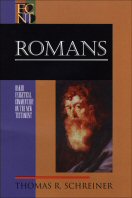
In the latest addition to BECNT, Pauline scholar Thomas Schreiner presents a fresh analysis of the substantive book of Romans. It presents many distinctive benefits. “I have tried to write a scholarly commentary that fulfills the goals of brevity and lucidity,” Schreiner explains. “One of my goals has been to trace the flow of thought in the letter so that the reader can understand how the argument unfolds. I have also tried to wrestle with the meaning of Romans theologically. . . . In particular, I have attempted to demonstrate inductively that the glory of God is the central theme that permeates the letter.”
Pastors, students, and scholars will find Romans an easy-to-use, yet comprehensive, resource.
Schreiner’s commentary on Romans is a very good contribution to the study of this Pauline epistle. Schreiner has asked the right questions about it and given balanced answers to them. His commentary will be a great help to students, teachers, and general educated readers of the Pauline letters, especially to pastors who seek to preach on Romans.
—Joseph Fitzmyer, professor emeritus, biblical studies, Catholic University of America, Washington, DC
As I preach through Romans I will continue to reach for this commentary with joy and hope, as I have since I received a copy in manuscript form. There are at least four reasons. First, Schreiner bows with reverence before the authority of Paul’s letter as God’s inspired Word. Second, he submits meticulously to the grammatical and historical particularities of the text, tracing out Paul’s line of thinking in his own terms. Third, he wrestles with recent scholarly thought (without getting lost). Fourth, he is faithful in holding up the manifestly God-centered theme of this greatest of all letters, namely, that ‘in Romans God’s ultimate purpose is to display his glory to all people’.
—John Piper, pastor, Bethlehem Baptist Church
Thomas R. Schreiner (PhD, Fuller Theological Seminary) is James Buchanan Harrison Professor of New Testament Interpretation at Southern Baptist Theological Seminary in Louisville, Kentucky. He is the author or editor of numerous books, including New Testament Theology; Magnifying God in Christ and Paul, Apostle of God’s Glory in Christ: A Pauline Theology.
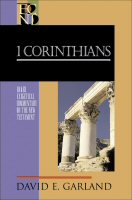
David Garland’s detailed study of one of the most important epistles in the New Testament is sure to become a standard resource for pastors, students, and scholars. After an introductory chapter that considers the context of the epistle and what is known about the social setting and cultural world of Corinth, Garland turns to his exegetical study. In order to maintain the overall flow of Paul’s thought and show the larger themes more clearly, the verse-by-verse comments are organized in larger exegetical units. For each unit, the author provides a summary that locates it within the broader context of the surrounding material, and he provides his own translation of the Greek text.
The author’s wealth of knowledge and exhaustive research is evident in his exposition. To clarify the meaning of the text, he incorporates references from parallel material in the Pauline corpus and from extrabiblical sources that highlight relevant aspects of the religious, cultural, and social context. Throughout his study, Garland interacts with notable previous commentators and provides extensive notes for the reader’s consideration and further research. Relevant text-critical issues are discussed in a section labeled “Additional Notes.” There biblical scholars will find comments on the more technical aspects of the text, including variant readings and grammatical issues.
This thoroughly researched, clearly written volume is a fine addition to an already respected series. It will offer seasoned guidance to its grateful readers.
—Charles H. Talbert, distinguished professor of religion, Baylor University
A substantial piece of work. . . . Garland’s commentary will make its most significant contribution in the context of exegesis courses, where it will serve as a fine model and a stimulating conversation partner.
—Garwood P. Anderson, Review of Biblical Literature
David E. Garland (PhD, Southern Baptist Theological Seminary) is the associate dean for academic affairs and William M. Hinson Professor of Christian Scriptures at George W. Truett Theological Seminary, Baylor University. He is the author of numerous books, including award-winning commentaries on 1 Corinthians and Mark.
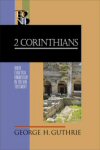
2 Corinthians
- Author: George H. Guthrie
- Series: Baker Exegetical Commentary on the New Testament (BECNT)
- Publisher: Baker
- Publication Date: 2015
- Pages: 736
In this addition to the award-winning Baker Exegetical Commentary on the New Testament (BECNT) (17 vols.) (BECNT), a respected New Testament scholar offers a substantive exegetical commentary on 2 Corinthians. George Guthrie leads readers through the intricacies of literary structure, word meanings, cultural backdrop, and theological proclamation, offering insights for students, pastors, and scholars. As with all BECNT volumes, this commentary features the author’s detailed interaction with the Greek text, extensive research, chapter-by-chapter exegesis, and user-friendly design. It admirably achieves the dual aims of the series—academic sophistication with pastoral sensitivity—making it a useful tool for teaching and learning the Bible.
Guthrie strikes the right balance in choosing how much information to impart without overloading the reader. . . . Pastors and teachers will find this a very useful volume in preparing messages on 2 Corinthians.
—Clinton E. Arnold, dean and professor of New Testament, Talbot School of Theology
George H. Guthrie serves as the Benjamin W. Perry Professor of Bible at Union University in Jackson, Tennessee. A specialist in New Testament and Koine Greek, he’s the author of NIV Application Commentary: Hebrews, coauthor of the esteemed Biblical Greek Exegesis: A Graded Approach to Learning Intermediate and Advanced Greek, and the instructor for the Mobile Ed course Book Study: The Letter to the Hebrews.
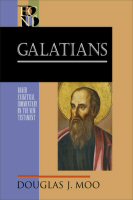
In this addition to the award-winning Baker Exegetical Commentary on the New Testament series, highly regarded New Testament scholar Douglas Moo offers a substantive yet accessible commentary on Galatians. Moo’s extensive research and thoughtful chapter-by-chapter exegesis lead you through all aspects of Galatians—sociological, historical, and theological—to help you better understand the book’s meaning and relevance.
In this age of unprecedented proliferation of biblical commentary series, it is an outstanding accomplishment for the Baker Exegetical series consistently to have produced what, with only rare exceptions, have become the best available commentaries on the Greek text of the New Testament book or books treated.
—Craig Blomberg, distinguished professor of New Testament, Denver Seminary
Rigorous exegesis by seasoned scholars with explicit evangelical commitments. This is also one of the best-designed, easy-to-read series as it includes intro matters, then each commentator’s translation, commentary, and textual notes for every passage. Very reliable.
—Bruce Riley Ashford, provost and dean of faculty, Southeastern Baptist Theological Seminary
Douglas J. Moo earned a PhD from the University of St. Andrews and now serves as the Kenneth T. Wessner Professor of New Testament at Wheaton College Graduate School. He is the author of Encountering the Book of Romans and commentaries on Romans, James, 2 Peter and Jude, and Colossians and Philemon, as well as coauthor of An Introduction to the New Testament. He also headed the committee on Bible translation for the NIV revision.
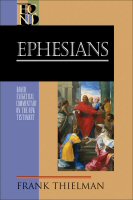
Noted New Testament scholar Frank Thielman offers a substantive yet accessible commentary on Ephesians. With extensive research and thoughtful chapter-by-chapter exegesis, this beautifully written commentary leads readers through all aspects of the book of Ephesians—sociological, historical, and theological—to help them better understand its meaning and relevance.
Careful historical exegesis, judicious exegetical decisions, and consistent concern to highlight the theology of the text make this an indispensable commentary.
—Eckhard J. Schnabel, Mary F. Rockefeller Distinguished Professor of New Testament Studies, Gordon-Conwell Theological Seminary
Thielman’s Ephesians admirably combines the features that distinguish excellent commentaries on Scripture: breadth of research in both classical and contemporary writings, careful attention to the form and structure of the Greek text, clear writing, and appropriate theological and practical application. This commentary will join Hoehner and O’Brien as the first references on Ephesians to which I turn.
—Douglas J. Moo, Blanchard Professor of New Testament, Wheaton College
Thielman’s commentary plumbs [Ephesians’] depths and is a model of informed and lucid interpretation. Like its subject, it is rich and edifying and repays careful reading.
—Brian S. Rosner, senior lecturer in New Testament, Moore Theological College
Frank Thielman (PhD, Duke University) is the Presbyterian Professor of Divinity at Beeson Divinity School, Samford University, in Birmingham, Alabama. He is the author of a number of books, including The NIV Application Commentary: Philippians (NIVAC); Paul and the Law: A Contextual Approach; From Plight to Solution: A Jewish Framework for Understanding Paul’s View of the Law in Galatians and Romans; The Law and the New Testament: The Question of Continuity; and Theology of the New Testament: A Canonical and Synthetic Approach. He is also an ordained Presbyterian (PCA) minister.
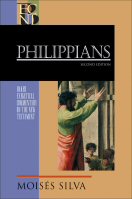
With its user-friendly design, this commentary by Moises Silva provides a substantive yet accessible discussion of Philippians to help pastors, students, and teachers understand and explain this letter. Each passage is presented in three parts: Silva’s own translation of the Greek text; exegesis and exposition of each unit of thought; and additional notes on textual matters. Throughout the commentary, Silva asks what is distinctive about this letter and shows how each passage contributes to Paul’s overall argument.
One cannot but be impressed with Silva’s skill as an exegete. His extreme care in analysing the text, his thorough understanding of the original language, his grasp of linguistic subtleties, his mastery of secondary sources—all combine to provide the reader with an excellent commentary.
—Gerald F. Hawthorne, Themelios
The exegetical discussion is fresh and vigorous, with good use being made of some of the ancient commentators and a judicious selection of the modern ones. . . . All who want a sound exegetical basis for their preaching and are prepared to wrestle with the Greek text will find that this is an ideal piece of work.
—I. Howard Marshall, Evangelical Quarterly
Moises Silva (PhD, University of Manchester) has taught New Testament at Westmont College, Westminster Theological Seminary, and Gordon-Conwell Theological Seminary.
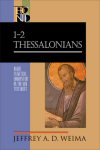
In this addition to the critically acclaimed BECNT series, respected New Testament scholar Jeffrey Weima offers pastors, students, and teachers the most up–to–date and substantive commentary available on 1-2 Thessalonians. Weima, a Thessalonians expert, experienced teacher, and widely traveled speaker, presents well–informed evangelical scholarship at an accessible level to help readers understand the sociological, historical, and theological aspects of these letters. As with all BECNT volumes, this commentary features the author's detailed interaction with the Greek text, extensive research, thoughtful chapter–by–chapter exegesis, and a user–friendly design. It admirably achieves the dual aims of the series—academic sophistication with pastoral sensitivity and accessibility.
Weima has written a full and authoritative commentary on 1 and 2 Thessalonians that readers will want to consult regularly and frequently. He brings a wealth of previous research to bear upon his exegesis. The result is well–considered and thoughtful positions at almost every juncture. One of the most appealing features of the commentary is Weima’s interpretation within the context of ancient epistolary structure, rather than the all–too–frequently–used rhetorical analysis. Weima sets the stage for his exegesis and exposition of each section by laying out the literary character and shape of the unit to be discussed. He also provides a detailed and helpful introduction to the commentary that emphasizes the historical background of these letters. Weima shows awareness of the current debate on a wide range of issues in Thessalonians research, while also ably defending traditional positions regarding authorship, interpretation, and even text–critical matters. I am sure that this commentary will be widely used.
—Stanley E. Porter, president, dean, and professor of New Testament, McMaster Divinity College
Is it possible for a commentary to be both technical and accessible, comprehensive and concise, academic and pastoral? Weima has produced precisely such a commentary on the Thessalonian letters. One would be hard–pressed to find a full–length, up–to–date treatment of these letters that offers more than Weima’s. Judicious in judgment, gracious in engagement, and clear in argument, this commentary catapults Weima to the front of an increasingly crowded field. It will become a standard, go–to resource for scholars, ministers, and students alike.
—Todd D. Still, the William M. Hinson Professor of Christian Scriptures, Truett Seminary, Baylor University
Already an acknowledged expert on the Thessalonian letters, Weima offers fellow Christians a clear and erudite interpretation. This exegetical commentary now stands among the authoritative works on 1 and 2 Thessalonians.
—L. Ann Jervis, professor, Wycliffe College, University of Toronto
Jeffrey A.D. Weima is professor of New Testament at Calvin Theological Seminary in Grand Rapids, Michigan, where he has taught for more than twenty years. He is the author of Neglected Endings: The Significance of the Pauline Letter Closings and the coauthor (with Stanley Porter) of An Annotated Bibliography of 1 and 2 Thessalonians. He has taught courses all over the world, has authored numerous scholarly articles, and leads biblical study tours to Greece, Turkey, and Italy.
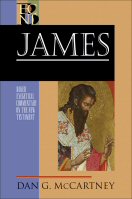
In this volume, an expert in the field of Biblical Interpretation, Dan McCartney, provides a detailed and thorough exegesis of the book of James through direct interaction with the Greek text. Working from the text, McCartney also provides a thorough sociological, historical, and theological treatment of James with rigorous academic sophistication. Nevertheless, the content of this commentary remains highly accessible and will prove to be an excellent tool for students, pastors, and scholars.
A fresh and important contribution to the literature on James. This work is exegetically rewarding, theologically rooted, and pastorally wise.
—Thomas R. Schreiner, James Buchanan Harrison Professor of New Testament Interpretation, Southern Baptist Theological Seminary
Dan McCartney has written an informed, scholarly, and evangelical commentary on James that is both readable and informative. It contains fresh perspectives in addition to covering the ground that all solid commentaries need to cover. It will be quite useful to evangelical pastors who want a solid basis for preaching or teaching on James.
—Peter H. Davids, professor of biblical theology, St. Stephen’s University
Dan G. McCartney (PhD, Westminster Theological Seminary) is a professor of New Testament interpretation at Redeemer Seminary in Dallas, Texas. He previously taught at Westminster Theological Seminary in Philadelphia for more than 20 years.
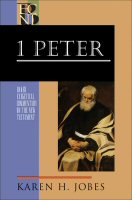
In this addition to the acclaimed BECNT series, Karen H. Jobes provides a fresh, insightful commentary on 1 Peter that will help students and pastors understand and apply this important letter. Throughout the commentary, Jobes emphasizes the Christian’s relationship to culture and the place of suffering in the Christian life. She also presents a new suggestion about the original recipients of the letter, highlights the insights provided by the use of the Septuagint in the letter, and challenges prevailing assumptions about the nature of the Greek in the letter.
As with all BECNT volumes, 1 Peter features the author’s own translation of the Greek text and detailed interaction with the original text. This commentary admirably achieves the dual aims of the series—academic sophistication with pastoral sensitivity and accessibility.
[Jobes’s] work is marked by deft engagement with the Greek text, dexterous handling of the secondary literature, and clarity of argument, with alternative viewpoints regularly given their due.
—Joel B. Green, Catholic Biblical Quarterly
‘How good is the Greek of 1 Peter?’ asks Jobes in an excursus to this new volume in the Baker Exegetical Commentary series. She gives evidence that it is good but not so good that Peter the fisherman could not have written it. Her attention to detail throughout and her expertise in the Greek Old Testament make this a work that deserves to be added to a fairly short list of commentaries on 1 Peter that are not to be missed.
—J. Ramsey Michaels, professor of religious studies emeritus, Southwest Missouri State University
Karen H. Jobes (PhD, Westminster Theological Seminary) is the Gerald F. Hawthorne Professor of New Testament Greek and Exegesis at Wheaton College. She has written the NIV Application Commentary on Esther, as well as a detailed study of an ancient Greek version of Esther, and is the coauthor of Invitation to the Septuagint.
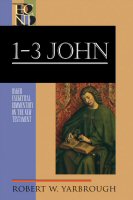
Robert Yarbrough offers a historical and theological commentary on the Johannine Epistles. The commentary explores the relationship between John’s Epistles and Jesus’ work and teaching, interacts with recent commentaries, reviews the history of interpretation, and seeks to relate these findings to global Christianity. Yarbrough looks at the Johannine Epistles from several perspectives—sociological, historical, and theological. The result is a guide that clearly and meaningfully brings 1–3 John to life for contemporary readers.
[An] expert, stimulating, and astutely pastoral reading of the Epistles of John. . . . Not least in its lively and very considered analysis and translation of the Greek texts, Yarbrough’s commentary offers something worthwhile at every turn.
—John G. Lodge, Catholic Biblical Quarterly
By attempting to read 1–3 John in a fresh way, uncoerced by (though not uninformed by) scholarly tradition, Yarbrough offers a helpful and often different perspective on the Johannine Epistles, some of the most interpretively complex material in the New Testament. I find especially helpful his illuminating engagement with the history of interpretation, his careful attention to textual questions, and his quite insightful appeal to the language of the Greek version of the Old Testament (the background John and his audience shared).
—Craig S. Keener, professor of New Testament, Palmer Seminary
Robert W. Yarbrough (PhD, University of Aberdeen) is a professor of New Testament at Covenant Theological Seminary in St. Louis, Missouri. He has authored, coauthored, or translated several books, including the groundbreaking textbook Encountering the New Testament. He is also coeditor of the Baker Exegetical Commentary on the New Testament series.
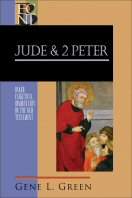
Respected New Testament scholar and teacher Gene Green offers a linguistically and rhetorically informed commentary on the books of Jude and 2 Peter. With extensive research, using recent scholarship, Green leads readers through the sociological, historical, and theological aspects of these New Testament books. This commentary will deepen your understanding of these letters.
Green reveals himself to be well-informed, clearly in control of a vast amount of detail. . . . This is a fine example of a historical-grammatical commentary, informed by significant knowledge of classical literature and recognition of rhetorical structures.
—Peter H. Davids, Review of Biblical Literature
This commentary is full of careful historical exegesis that is especially well informed by the literature, philosophy, and rhetoric of the Greco-Roman world. It is an ideal companion to a detailed study of these still undervalued New Testament books.
—Richard Bauckham, emeritus professor of New Testament studies, St. Andrews University, Scotland
Gene L. Green (PhD, University of Aberdeen) is a professor of New Testament at Wheaton College in Wheaton, Illinois. He is the author of commentaries on 1 and 2 Thessalonians and 1 Peter, as well as numerous articles. Prior to coming to Wheaton in 1996, he taught in Latin America for 13 years.
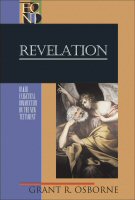
The Book of Revelation contains some of the most difficult passages in Scripture. Grant Osborne’s commentary on Revelation aims to interpret the text while also introducing readers to the perspectives of contemporary scholarship in a clear and accessible manner.
Osborne begins with a thorough introduction to Revelation and the many difficulties involved in its interpretation. He discusses authorship, date of writing, and the social and cultural setting of the work. He also examines elements that complicate the interpretation of apocalyptic literature, including the use of symbols and figures of speech, Old Testament allusions, and the role of prophetic prediction. Osborne surveys various approaches commentators have taken on whether Revelation refers primarily to the past or to events that are yet future.
Osborne avoids an overly technical interpretative approach. Rather than exegeting the text narrowly in a verse-by-verse manner, he examines larger sections in order to locate and emphasize the writer’s central message and the theology found therein. Throughout, he interacts with the best recent scholarship and presents his conclusions in an accessible manner. When dealing with particularly problematic sections, he considers the full range of suggested interpretations and introduces the reader to a broad spectrum of commentators.
Osborne has successfully combined a thorough familiarity with the text of Revelation, a detailed knowledge of recent scholarship, and a clear writing style with a vital concern for the practical needs of students, pastors, and laity alike. His commentary invites a broad readership and will serve as an excellent text for courses on Revelation.
—David E. Aune, Walter Professor of New Testament & Christian Origins, University of Notre Dame
This clearly written commentary reflects thorough engagement with the literature and careful interaction with the text. I find Osborne’s judgments sound and well-supported. This work is an excellent resource for both scholars and students and will undoubtedly takes its place among the standard academic commentaries on Revelation.
—Craig Keener, professor of New Testament, Eastern Seminary
Grant R. Osborne (PhD, University of Aberdeen) is a professor of New Testament at Trinity Evangelical Divinity School. He is the author of a number of books, including The Hermeneutical Spiral.
Reviews
6 ratings

EMANUEL BATISTA UCHOA
4/30/2019
Wilson Clark
4/5/2019
Rev. Elton Wilson
11/16/2018
Brian Brennt
10/5/2018
David Minnick
9/22/2018